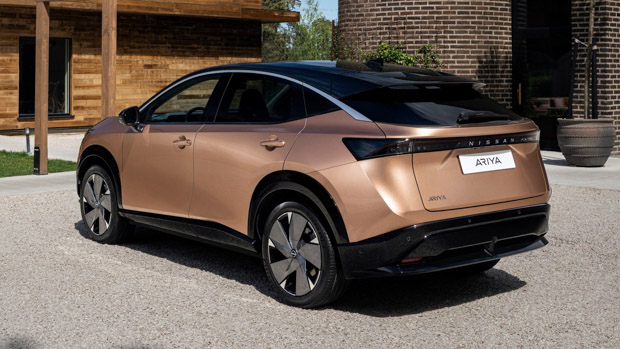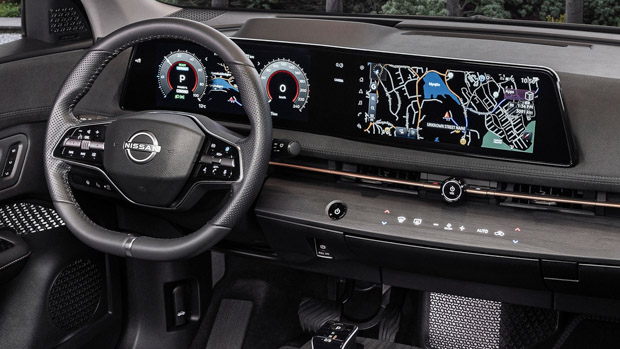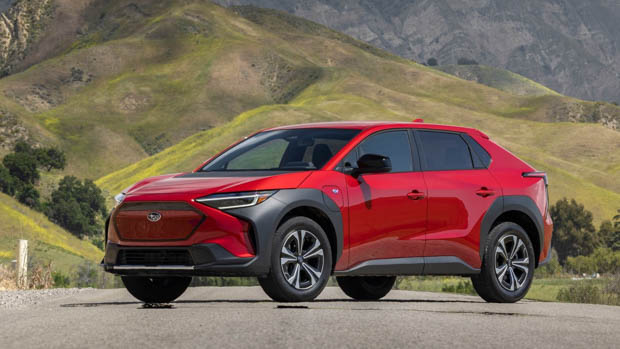-
Car Reviews
- All reviews
- Midsize SUVs
- Small cars
- Utes
- Small SUVs
- Large SUVs
- Large cars
- Sports SUVs
- Sports cars
- Vans
Latest reviews
- Car News
-
Car Comparisons
Latest comparisons
- Chasing Deals
Significant global demand for Ariya sees order books closed, but Australia would be in the running to get the SUV if regulations were tighter
Nissan Australia has not yet received an allocation of the brand’s Ariya electric midsize SUV, partially because of the lack of fleet-average CO2 emission targets for car manufacturers in the Australian market.
The Ariya launched in Europe and the United States earlier in 2022, and the crossover has received considerable praise for its ride and handling, particularly from the British motoring press.
Nissan’s first all-new EV since the Leaf, the Ariya is a five-seat SUV based on the Renault-Nissan Alliance CMF-EV platform, running either single-motor front-wheel drive (FWD) or dual-motor all-wheel drive (AWD), with approximately 360-500km range.
Speaking with Chasing Cars, Nissan Australia managing director Adam Paterson said that the brand’s Japan headquarters sends allocations of its electric vehicles to markets where sales of EVs are required or incentivised by legislation and regulation.
“When the company is looking at making allocation decisions for the Leaf today, or for the Ariya tomorrow, they look at the jurisdictions that have confidence that the EV market is going to be there because of legislation … or that we need to deliver to hit a fleet-average emissions level in line with that jurisdiction’s regulations,” Paterson said.
The clear statement by Paterson places the onus on the Australian federal government – or at least individual states – to put in place a regulated fleet-average CO2 target. This is a mechanism that finds the average CO2 emissions across all vehicles a carmaker delivers in Australia in a given year.
“Our position is that we support a target for Australia, from a CO2 emission standpoint, on a fleet-average basis … we will obviously abide by any rules and regulations that are put in place,” said Paterson.
“I think what we are getting on Ariya now is that there is not the requirement to deliver it from an emissions standpoint. The company sees that there is an opportunity for them, and Australians are interested in the car.
“But my point is that we don’t require it in order to be able to sell the rest of the line-up. We require it to be able to sell the rest of the [Nissan] line-up in other markets.”
Paterson said there was no view that the Ariya could not sell well in Australia if it was brought here – but that the lack of a CO2 target means it is hard to predict how many units could be sold locally.
“I think the company realises that the vehicle would do well when it gets here. I don’t think anyone at Nissan Japan or Australia thinks that the vehicle wouldn’t succeed here.
The Nissan Australia chief suggested that the lack of a fleet-average CO2 emissions target in Australia has the effect of obscuring the actual size of the electric SUV market.
“It’s also about when we decide to gear up as far as production is concerned … what is truly the demand for midsize SUVs that are electrified at a specific price point?,” queried Paterson.
“I think there is still some debate as to actually what that volume is. But again, a target would solidify that.”
This is a view that is not shared by many rival carmakers, many of whom are proceeding to sell electric SUVs in Australia in the absence of a target – albeit mostly in relatively small volumes.
Hyundai, Kia, BMW and Mercedes-Benz each sell at least two electric SUVs in Australia, and mainstream players Toyota, Subaru and Volkswagen will launch EV crossovers locally within months.
American EV specialist Tesla is an outlier, shifting substantial volume of its all-electric range in Australia. In 2021, Tesla sold 12,000 Model 3 electric sedans locally, but it has now shifted the bulk of its Chinese production to the Model Y midsize SUV for Australia. Chasing Cars understands that Tesla is holding in excess of 10,000 Australian Model Y orders.
Nissan revealed the Ariya in 2020, and builds the electric SUV in Japan. Interest in the model has been strong in the markets where it is initially planned to be sold, including Europe, the United Kingdom, and some parts of the United States.
“They opened up [Ariya] orders in parts of Europe and in the US, and they’ve now closed them, because demand for the SUV has outstripped what we’re able to supply,” Paterson said.
“The concern is frustrating customers who have put deposits down or at least expressed interest in dealers – and we can’t give them a timeline on when we are going to be able to satisfy that.”
“So that just shows how much demand there is [for Ariya]…the thought is, the current markets [where Ariya is] on sale have some type of regulatory requirement to have a fleet [CO2] average. You can draw the lines between those two. We can’t even meet the demand because we’ve stopped orders in [those markets.].”
Latest news
About Chasing cars
Chasing Cars reviews are 100% independent.
Because we are powered by Budget Direct Insurance, we don’t receive advertising or sales revenue from car manufacturers.
We’re truly independent – giving you Australia’s best car reviews.


